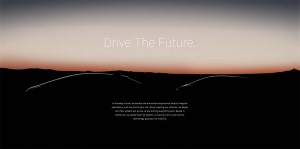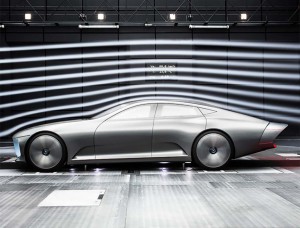Who or what is Faraday?
Like Nikola Tesla, the patron saint of battery-carmaker Tesla Motors, Michael Faraday was a pioneer in the fields of magnetism and electricity, and his name is now being used by another mysterious electric vehicle start-up, Faraday Future.
Emerging out of the blue, the company has set up shop in California and says it is looking to put up a new, $1 billion manufacturing plant But exactly where its money is coming from and what sort of cars it plans to build are far from clear.
“When creating our vehicles, we began with four wheels but we are re-envisioning everything else,” Faraday Future declares in a newly launched website. “With backgrounds in automotive, aerospace, biomedical, consumer electronics, and others, our rapidly growing engineering team brings a uniquely diverse approach to the future of mobility.”
Over the past decade, there’s been a burst of start-up activity like the auto industry hasn’t seen in decades, with most of those automotive wannabes focused on alternative powertrain technology. The vast majority have quickly folded, overwhelmed by the costs and technological challenges. But a rare few, notably Tesla, have actually gotten into production.
(Tesla beats forecast – still loses $75 mil in Q3. Click Here for the latest.)
Whether Faraday will make it into that elite is far from certain. Indeed, exactly what Faraday is remains unclear. A spokeswoman reached by the Associated Press, Stacy Morris, would only say, “We’re in stealth mode where we’re not revealing ownership.” She added, “There’s a significant investor who wants the company to stand on its own merit before being associated” with it.”
Faraday was originally incorporated in the State of California in May 2014, according to the AP, as LeTV ENV Inc. That links it to a Beijing-based holding company owned by Jia Yueting, a man often referred to as the Chinese Steve Jobs.
The Asian billionaire has followed a similar path, until now focusing on smartphone and television technologies, but also planning to launch a new online store in the U.S. before the end of the year. Like Jobs, Yueting sees himself as a visionary who takes pride in “disrupting” traditional industries.
The now renamed Faraday Future apparently employs about 400, a number of them poached from Tesla – which itself has been hiring talent away from traditional automakers as well as tech giant Apple.
What little is known about Faraday’s plans is that it wants to produce an all-electric vehicle focused on the high end of the market – a broadly outlined business strategy that so far resembles Tesla’s. That Silicon Valley firm recently launched its Model X electric SUV, which will offer various version priced into the $100,000 range.
But where the Tesla Model X and Model S sedans visually resemble traditional automotive offerings, an image on the new Faraday website offers a silhouette of two decidedly different-looking vehicles, their bubble shapes looking more like something from a science fiction flick.
The closest to anything done by a traditional manufacturer might be two recent concept cars: the Mercedes-Benz Concept IAA introduced at the Frankfurt Motor Show in September, and the Toyota FCV Plus revealed at the recent Tokyo Motor Show.
(Click Here for more on the radical Mercedes-Benz Concept IAA.)
“The FF Design team members have each been hand selected to create something that the world has never seen before,” the company’s website hints.
The exotic design and the battery-based drivetrain may be just the beginning of Faraday’s push to differentiate itself from traditional automotive manufacturers. Spokeswoman Morris mysteriously hints that, “People’s lives are changed by their mobile devices, the way that we interact. The car industry hasn’t caught up sufficiently. The car still feels like a place where you’re disconnected.”
The start-up apparently wants to move fast and could have its first car on the road by 2017. That might be a stretch considering it doesn’t even have a factory. But it says it is already working to fill that gap, with four states now in the running for what it says will be a $1 billion assembly plant.
(Toyota pushes design boundaries with FCV Plus. Click Here for a closer look.)
Faraday Future hasn’t completely broken from the rest of the auto industry, ironically. It is now operating out of a building in the Los Angeles suburb of Gardena that used to be the U.S. headquarters of Nissan before it moved to Nashville.
Nissan is one of the traditional industry’s most active proponents of both battery power and autonomous driving. Its Leaf model is the world’s best-selling EV and it is planning to add more models to the line-up in the coming years.
Nissan isn’t alone. General Motors has just launched a redesigned version of the Chevrolet Volt, and is readying a long-range pure battery-electric vehicle, the Chevy Volt. Indeed, there are dozens of new plug-based vehicles scheduled to reach market over the next five years, even though the segment is expected to grow only modestly in the coming years. Navigant Research estimates such products will account for just 468,000 sales in 2023, or 2.6% of the total U.S. new vehicle market.
Whether any of the start-ups, including Tesla, will be around then is far from certain, but Chinese entrepreneur Yueting appears to be willing to bet a billion or more he’ll find his niche.




Well, it’s a good laugh to read about this. I hear they are happily overpaying their talent, so a couple of year gig for a young engineer might be good fun.
I wonder if this company will also get a $465 million loan from Obama?
GT, here’s an interesting fact: more than half of the loans provided by the Obama Admin actually resulted in payback AND companies that went ahead and have been successful — perhaps only initially, but still successful. (Tesla is one, whether we like it or not, Wall Street greatly validating that point.)
Now, go look at some of the venture capital and angel funds who are backing many of the same types of companies. In fact, look at VCs and their ilk overall. Their track record is — for a VERY solid VC — getting payback from barely 10% of the companies they fund. There’s plenty of data available to support both of these points. Take the politics out for a minute and the reality is that the government loan fund picked five times as many “winners” as the typical VC.
Paul E.